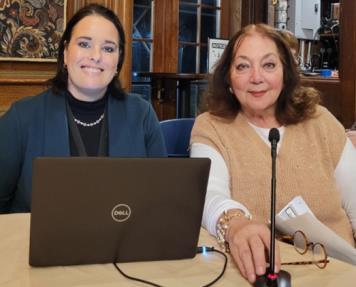
3 minute read
Annual Board Compass Training
Annual board of directors Compass training was completed on November 21, 2022 by Susan Gill Orange CQL certified POM Trainer and Bridget Cariello, Assistant Director of Project Development on Natural Supports and the Value of Social Roles.

Advertisement
The duo developed a presentation that stressed the importance and value of a natural support network and accompanying social roles. The main theme of the discussion was the interconnectedness of natural support systems with the establishment of crucial social roles. This was demonstrated by the linking of natural supports, i.e., family, friends, with the introduction and instruction of the types of expected behavior that is culturally established for any given social role in the community. The point is that the more familiar a person is with what is expected of them in the world at large, the easier it will be for them to acquire the kind of social capital that affords people with disabilities a place at the table so to speak. Understanding the meaning of social roles and the expectations within them is the way human beings create the social capital needed to navigate through life.
The importance of emphasizing the need to promote the retention of natural supports and the creation of social roles is a vital part of the lives of people we support. We hope we have accomplished this in a productive and interesting way.
A Message from Board President, Saundra Gumerove
“As holiday season starts, so does disability advocacy.” Saundra Gumerove, Esq., President of the Board of Directors at AHRC Nassau and Adjunct Professor at the Maurice A. Deane School of Law at Hofstra University, shared in an edition of Long Island Business News why it’s one of her family’s most heartfelt traditions and why engaging legislators is critical to ensuring sustainable disability services.
This holiday season, reconnecting in person will be especially meaningful. After years of social distancing, I look forward to sitting around the table with family and friends to catch up and of course do a little bragging about our children. Whatever amazing job, school, or internship comes up, I’m happy to hear. I’m also ready to share the successes of my daughter, Lauren, my “miracle baby” who inspired one of our family’s most heartfelt holiday traditions disability advocacy.
This tradition started when Lauren was born with developmental disabilities, including a number of health issues, a rare birth defect that impacted the shape and color of her face, as well as a processing issue that hindered her ability to read or write. Doctors didn’t think Lauren would survive infancy. Special education schools told me she couldn’t learn. Lauren did both.
At 40 years old, Lauren is a social butterfly, unfazed and even cordial, to the people who stare at her in public. Lauren’s profound kindness makes me proud. She understands their discomfort – that typical Long Islanders don’t often engage with people with disabilities, let alone understand the experience of disability. They don’t know about what it’s like living in a group home or depending on government funding for the essential services to live your life. They have no point of reference for home- and community-based services indispensable for everyday tasks, from getting dressed to running errands.
People don’t know Lauren or her peers, but they need to know. The state-funded disability services that ensure Lauren’s independence are the first to be put on the legislative chopping block. Every year, just like there’s a holiday season, the disability community must prepare for an aggressive advocacy campaign to maintain the current level of state funding or lose ground.
This annual campaign is exhausting and is in response to a span of 10 years when New York didn’t invest in the statutorily required cost of living adjustment (COLA). Though the 2022-2023 budget included a 5.4 percent COLA, the damage remains as nonprofit providers struggle with inflation and $100.5 million in costs due to high staff turnover. A lack of investment in salaries has led to nearly 20,000 open positions across the state for direct support professionals (DSPs), the caregivers who support people with disabilities.
Even as the lights and wreaths go up, advocates are ramping up for the 2023-2024 budget and calling for several notable requests to create a more sustainable system and workforce for over 130,000 New Yorkers with developmental disabilities. We’re telling our friends and relatives, emailing, tweeting, calling and visiting legislators for an 8.5 percent COLA so provider agencies can address increasing operational costs as well as a Direct Support Wage Enhancement (DSWE) to recruit and retain staff.
These changes happen when concerned constituents, like you, reach out to newly elected legislators and tell them these issues matter. By doing so, you are also affirming a sense of belonging and connection to all who live and work on Long Island a holiday tradition if ever there was one.
Please be sure to share your support with state leaders throughout the year!







